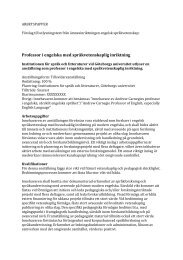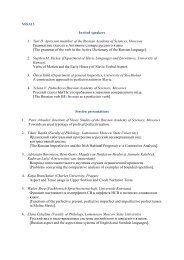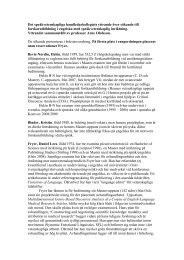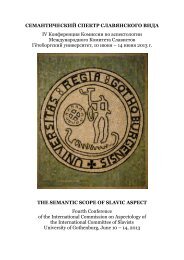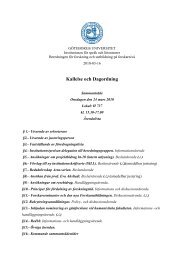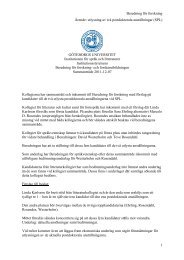katerina ierodiakonou
katerina ierodiakonou
katerina ierodiakonou
- No tags were found...
Create successful ePaper yourself
Turn your PDF publications into a flip-book with our unique Google optimized e-Paper software.
Christina Thomsen ThörnqvistInstitutionen för språk och litteraturertel. 031-786 4348christina.thornqvist@class.gu.seInbjudan av internationella gästforskare: Förslag till nominering.Härmed föreslås att prof. Katerina Ierodiakonou, Aten, nomineras till gästforskare vidHumanistiska fakulteten inom ramen för gästforskarprogrammet 2010–2011.Katerina Ierodiakonou disputerade 1990 i filosofi vid London School of Economics ochhennes forskningsområde har sedan avhandlingen om stoisk logik (‘Analysis in StoicLogic’) varit antik och bysantinsk filosofi med särskild inriktning på logikens historia ochpå den bysantinska receptionen av den antika filosofin. Under perioden 1993–2004 varIerodiakonou framför allt verksam vid universitetet i Oxford och sedan 2006 är honprofessor i antik filosofi vid Atens universitet. Av hennes CV som här bifogas framgår atthon därutöver har haft en lång rad anställningar som gästforskare vid internationelltledande lärosäten som King’s college (London), Institute for advanced study (Princeton)och Humboldt-Universität zu Berlin. Hon har genom en omfattande och högkvalitativvetenskaplig produktion etablerat sig bland de världsledande inom sitt ämnesområde.Hennes forskning om den bysantinska receptionen av den antika filosofin måste i fleraavseenden betecknas som banbrytande.Katerina Ierodiakonou bjöds in till den workshop om receptionen av Aristoteles Förstaanalytik som hösten 2009 arrangerades vid GU inom ramen för det internationella forskarnätverketDen aristoteliska traditionen: Receptionen av Aristoteles verk under medeltiden. Nätverketfinansieras av Riksbankens jubileumsfond för perioden 2009–2012 och leds från GU (fören beskrivning av nätverkets verksamhet, sehttp://sprak.gu.se/forskning/forskningssamverkan/the-aristotelian-tradition/).Den bysantinska receptionen av Aristoteles logik och metafysik är fortfarande ett områdesom är otillräckligt kartlagt och analyserat, men ytterst relevant för forskningen i denvästeuropeiska traditionen. Ierodiakonous expertis på området har varit oumbärlig förnätverkets gemensamma arbete kring beröringspunkterna mellan Öst och Väst i denmedeltida filosofins utveckling och samarbetet mellan henne och nätverkets forskare äralltså mycket väl etablerat.Inte oviktigt i detta sammanhang är att Katerina Ierodiakonou i internationella forskarkretsarär välkänd för sin utomordentligt goda samarbetsförmåga. Om detta vittnar bl aden bifogade publikationslistans många redaktörskap.Ett av Katerina Ierodiakonous specialområden är antik färgteori, ett ur filosofisk synvinkelkomplicerat ämne av tydlig tvärvetenskaplig karaktär. Av den bifogade publikationslistan
framgår att hon publicerat ett antal artiklar på området. För närvarande slutför hon arbetetmed en monografi om antik färgteori. Här föreslås att Katerina Ierodiakonou anställs somgästforskare under perioden 15 april–15 juni 2011 och att hon under sin vistelse vid GUgenomför en seminarieserie om färgteori ur ett filosofihistoriskt perspektiv. En plan föroch beskrivning av seriens innehåll bifogas nomineringsförslaget. Seminarieserien skall varaöppen för alla forskare, lärare och forskarstuderande vid GU och efter samråd medlärare/forskare i nedanstående ämnen kan konstateras att seminarieserien är relevant föråtminstone följande ämnen vid fakulteten:• filosofi• idé- och lärdomshistoria• litteraturvetenskap• latin• grekiska• antikens kultur och samhällslivLöneförslag: 42 tkr/mån. Därtill 10 tkr/mån för boende i Göteborg.Göteborg 2010.10.16Christina Thomsen Thörnqvist
CURRICULUM VITAEKATERINA IERODIAKONOUwork address: Department of Philosophy and History of Science, University of AthensUniversity Campus, Ilisia 15771, Athens, Greecehome address: Theorias 6, Athens 10555, Greecetel: ++30 210 7275533 (office), ++30 210 3242133 (home), fax: ++30 210 7275530e-mail: iero<strong>katerina</strong>@phs.uoa.grEDUCATION1985-1990 Ph.D., Department of Logic and Scientific Method, LSEthesis title: “Analysis in Stoic Logic”1983-1985 M.Phil., Philosophy Department, University of Thessaloniki1979-1983 B.A., Philosophy Department, University of ThessalonikiUNIVERSITY EMPLOYMENT2006- Associate Professor in Ancient PhilosophyDept. of Philosophy and History of Science,University of Athens2000- 2006 Assistant Professor in Ancient Philosophy and Logic,Dept. of Humanities, National Technical University, Athens2000-2004 Fixed-Term Tutorial Fellow in Philosophy,St. Hugh's College, Oxford2003/04/06 summers Visiting ProfessorPhilosophy Department, Central European University, Budapest1995-2000 Lecturer in Ancient Philosophy and Logic,Dept. of Humanitites, National Technical University, Athens1994-1999 Lecturer in PhilosophyUniversity College, Oxford
1999 summer Visiting LecturerDepartment of Philosophy, Bogazici University, Istanbul1998-1999 Lecturer in Ancient PhilosophyDepartment of Philosophy, York University1994-1996 Lecturer in PhilosophyBrasenose College, Oxford1994 spring Lecturer in Greek PhilosophyFaculty of Classics, Cambridge1993-1994 Lecturer in Ancient PhilosophyWorcester College, OxfordChrist Church, Oxford1987-1990 Teaching AssistantDepartment of Logic and Scientific Method, LSEACADEMIC AWARDS2010 spring Researcher at the Centre for Advanced StudiesNorwegian Academy of Science and Lettersproject: Eudaimonia2010 autumn Visiting Professor, Centre of Excellence Topoi,Humboldt University, Berlin2003 autumn Member in the School of Historical StudiesInstitute for Advanced Study, Princeton1990-1993 British Academy Post-Doctoral Research FellowDepartment of Philosophy, King's College, Londonproject: “Byzantine Commentators on Aristotle's Prior Analytics”1990 autumn Visiting FellowDepartment of Philosophy, Princeton UniversityACADEMIC ACTIVITIES• Co-editor of the journal for Ancient Philosophy and Science ‘Rhizai’.2
• Member of the editorial board of the journal Philosophie Antique: Problèmes,Renaissances, Usages.• Co-editor of the Greek philosophical journal ‘Cogito’.• Founding member of the South-East European Association for Ancient Philosophy.• Member of the External Review Panel of the Institute for Advanced Study,Princeton.• Member of the European Science Foundation Pool of Reviewers.• Vice President of the Committee for Byzantine Studies, Société International pour l’Étude de la Philosophie Médiévale• Organizer of the Erasmus Exchange Program in Ancient Philosophy between theUniversity of Athens and the Universities of Utrecht, Budapest, Paris and OsloPUBLICATIONSI. Books• co-editor (together with B. Morison) of Episteme etc.: Essays in Honour ofJonathan Barnes (collection of papers by M. Burnyeat, M. Schofield, D.Charles, B. Morison, M. Frede, J. Hankinson, S. Bobzien, A. Kenny, M. Griffin.J. Annas, G. Striker, I. Rumfitt, S. Everson, K. Ierodiakonou, G. Fine, R.Sorabji), Oxford University Press, Oxford 2011 (forthcoming)• co-editor (together with S. Roux) of Thought Experiments. Methodological andHisorical Perspectives (collection of articles by K. Ierodiakonou, P. Lautner, C.Grellard, S. Knuuttila, T. Kukkonen, C.-R. Palmerino, S. Virvidakis, P. Engel,J.-Y. Goffi, S. Roux, J. Zeimbekis), Brill, Leiden 2010 (forthcoming)• editor of The Use of Examples in Philosophy (collection of articles in Greek byP. Kalligas, F. Zika, V. Kindi, S. Virvidakis, A. Koutoungos, G. Prelorentzos,A. Baltas), Ekkremes, Athens 2005• editor of Byzantine Philosophy and its Ancient Sources (collection of articles byS. Ebbesen, P. Kalligas, D. O’Meara, M. Frede, J. Duffy, J. Barnes, K.Ierodiakonou, P. Athanassiadi, G. Karamanolis, B. Bydén, L. Benakis), OxfordUniversity Press, Oxford 2002• co-editor (together with S. Virvidakis) of Greek Philosophy from Antiquity tothe 20th century, (collection of articles in Greek by !. "alogerakos, P.3
Thanassas, C. Balla, V. Tsouna, P. Dimas, V. Politis, K. Ierodiakonou, P.Kalligas, E. Giannakis, G. Zographidis, S. Virvidakis), Greek Open UniversityTextbooks, Patras 2000• editor of Topics in Stoic Philosophy (collection of articles by J. Barnes, S.Bobzien, M. Frede, K. Ierodiakonou, B. Inwood, M. Mignucci, P. Mitsis, D.Obbink, D. Sedley), Oxford University Press, Oxford 1999 (published inpaperback 2001)• editor of Topics in Stoic Philosophy (in Greek), Deukalion 15/1 (1997)• Alexander of Aphrodisias on Aristotle: Prior Analytics 1.1-7 (translated by J.Barnes, S. Bobzien, K. Flannery & K. Ierodiakonou), Duckworth, London 1991II. Articles• “Byzantium’, in The Cambridge History of Medieval Philosophy (ed. R. Pasnau),Cambridge 2010, 39-49• “Some observations on Michael of Ephesus’ comments on Nicomachean EthicsX”, in Medieval Greek Commentaries on the Nicomachean Ethics (ed. C. Barber & D.Jenkins), Leiden / Boston 2009, 185-201• “Syrianus on scientific knowledge and demonstration”, in Syrianus et lamétaphysique de l’antiquité tardive (ed. A. Longo), Naples 2009, 401-22• “Basic and mixed colours in Empedocles and in Plato”, in L’antiquité en couleurs:Catégories, pratiques, représentations (ed. M. Carastro), Grenoble 2009, 119-130• “The philosopher as God’s messenger”, in The Philosophy of Epictetus (eds. T.Scaltsas & A. Mason), Oxford 2007, 56-70• “The Stoics and the Skeptics on memory”, in Tracce nella mente (ed. M. M.Sassi), Pisa 2007, 47-65• “Rationality and revelation in eleventh and twelfth century Byzantium”, in De usurationis. Vernunft and Offenbarung im Mittelalter (eds. E. Homann & A. Krüger),Würzburg 2007, 19-31• “The Greek concept of sympatheia and its Byzantine appropriation in MichaelPsellos”, in The Occult Sciences in Byzantium (eds. P. Magdalino & M. Mavroudi),Geneva 2006, 97-117• “The early modern Greek logical textbooks (1453-1821)” (in Greek), inFestschrift in honour of Prof. P. Nianias (eds. A. Andreopoulos et al.), Athens 2006,85-1034
• “Stoic logic”, in Blackwell Companions to Ancient Philosophy: A Companion toAncient Philosophy (eds. M. L. Gill & P. Pellegrin), Oxford 2006, 505-29• “La réception de la philosophie antique et de la philosophie byzantine en Grècemoderne”, Rue Descartes 51 (2006), 8-16• “Plato’s theory of colours in the Timaeus”, Rhizai II.2 (2005), 219-33• “Metaphysics in the Byzantine Tradition: Eustratios of Nicaea on universals”,Quaestio 5 (2005), 67-82• “Empedocles on colour and colour vision”, Oxford Studies in AncientPhilosophy 29 (2005), 1-37• “Ancient thought experiments: A first approach”, Ancient Philosophy 25 (2005),125-40• “The Byzantine reception of Aristotle’s Categories”, Synthesis Philosophica 39 (2005),7-31 [French translation: “La réception Byzantine des Catégories d’ Aristote”, in LesCatégories et leur histoire (éd. O. Bruun & L. Corti), Paris 2005, 307-39]• “Byzantine commentators on the epistemic status of ethics”, in Philosophy, Science andExegesis in Greek, Arabic, and Latin Commentaries (eds. P. Adamson, H. Baltussen & M.W.F.Stone), suppl. Bulletin of the Institute for Classical Studies 2005, 221-38• “Empedocles and the ancient painters”, in Colour in the Ancient MediterraneanWorld (eds. L. Cleland & K. Stears), British Archaeological Reports Series 1267, 2004,91-4• “Adopting or adapting the Socratic paradigm?”, in The Proceedings of theInternational Symposium on Socrates. 2400 Years since his Death (ed. V. Karasmanis),Athens 2004, 451-4• “Ancient Greek philosophy in Modern Greece” (together with V. Karasmanis),in Greek Philosophy in the New Millenium. Essays in Honour of Thomas M. Robinson(ed. L. Rossetti), Sankt Augustin 2004, 310-10• “The self-conscious style of some Byzantine philosophers (11th-14th century)”,in Byzantium Matures (ed. C. Angelidi), Athens 2004, 99-110• “Aristotle’s use of examples in the Prior Analytics”, Phronesis 47 (2002), 127-52• “Zeno's arguments”, in Zeno of Citium and his legacy: The Philosophy of Zeno(eds. T. Scaltsas & A.S. Mason), Larnaca 2002, 81-1125
• “Psellos' paraphrasis on Aristotle's De interpretatione”, in Byzantine Philosophyand its Ancient Sources (ed. K. Ierodiakonou), Oxford 2002, 157-81• “The anti-logical movement in the fourteenth century”, in Byzantine Philosophyand its Ancient Sources (ed. K. Ierodiakonou), Oxford 2002, 219-36• “Socrates as a paradigm of philosophical life” (in Greek), in Socrates and hisPhilosophy, Athens 2002, 61-9• “Aristotle on colours”, in Aristotle and Contemporary Science (eds. D.Sfendoni-Mentzou, J. Hattiangadi & D.M. Johnson), vol. II, New York 2001, 211-25• “Hellenistic philosophy”, in Greek Philosophy from Antiquity to the 20thcentury (eds. S. Virvidakis & K. Ierodiakonou), Patras 2000, 217-62• “Galen's criticism of the Aristotelian theory of colour vision”, inAntiaristotelismo (eds. C. Natali & S. Maso), Amsterdam 1999, 123-41• “The study of Stoicism: its decline and revival”, in Topics in Stoic Philosophy(ed. K. Ierodiakonou), Oxford 1999, 1-22; (in Greek) Deukalion 15/1 (1997), 7-28• “Aspasius on perfect and imperfect virtues”, in Aspasius: The Earliest ExtantCommentary on Aristotle's Ethics (eds. A. Alberti & R.W. Sharples), Berlin/New York1999, 142-61• “Aristotle's logic: an instrument, not a part of philosophy”, in Aristotle: Logic,Language and Science (eds. N. Avgelis & F. Peonidis), Thessaloniki 1998, 33-53• “Anachronistic interpretations of ancient medicine” (in Greek), Greek Society ofthe History of Sciences and Technology 9 (1998), 5-11• “Plato on colours: Timaeus 67c4-68d7” (in Greek), Deukalion 15/2 (1997), 267-86• “Ancient and modern philosophers on ancient science” (in Greek), Indiktos 8(1997), 181-97• “The hypothetical syllogisms in the Greek and Latin traditions”, Cahiers del'Istitut du Moyen-Age Grec et Latin 66 (1996), 96-116• “Alexander of Aphrodisias on medicine as a stochastic art”, in Ancient Medicinein its Socio-Cultural Context (eds. Ph. van der Eijk et al.), vol. II, Amsterdam 1995,473-86• “The Stoic indemonstrables in the later tradition”, in Dialektiker und Stoiker.Zur Logik der Stoa und ihrer Vorläufer (eds. K. Döring & T. Ebert), Stuttgart 1993,187-2006
• “The Stoic division of philosophy”, Phronesis 38 (1993), 57-74; (in Greek) inHellenistic Philosophy (ed. K. Voudouris), Athens 1994, 128-37• “Medicine as a stochastic art” (together with Prof. J.P. Vandenbroucke), TheLancet 341 (1993), 542-3• “On two paintings of Egon Schiele” (in Greek), Enteukterion 15 (1991), 113-15• “Rediscovering some Stoic arguments”, in Greek Studies in the Philosophy andHistory of Science (ed. P. Nicolacopoulos), Boston Studies in the Philosophy ofScience, Boston 1990, 137-48• “The image of young men in the visual arts and Kavafis' poems” (in Greek), inKavafis and the Young Men (ed. D. Maronitis), Athens 1984, 51-61III. Encyclopedia Entries• “Aristotelian Corpus, de Coloribus”, The Encyclopedia of Ancient NaturalScientists (eds. P.T. Keyser & G.L. Irby-Massie), London / New York 2008, 146• “Byzantine Philosophy” (together with B. Bydén), Stanford Encyclopedia ofPhilosophy, www.plato.stanford.edu, 2008• “Byzantine Philosophy” (together with D. O’Meara), The Oxford Handbook ofByzantine Studies, Oxford 2008, 711-20• “Byzantine Philosophy”, Encyclopedia of Philosophy (2 nd edition), 2006, 786-90• Encyclopedia of Greece and the Hellenic Tradition (ed. G. Speake), vol. I-II,London/Chicago 2000: “Blemmydes Nikephoros” (vol. I, 238-9), “Logic” (vol. II, 957-9),“Metochites Theodore” (vol. II, 1049-50), “Michael of Ephesus” (vol. II, 1052), “PhiloponusJohn” (vol. II, 1307-8), “Stoicism” (vol. II, 1582-4)• Der Neue Pauly. Enzyklopädie der Antike, vol. 7, Stuttgart/Weimar 1999: “Logik”(393-400), “Logos” (401-5), “Wiederlegung” (505-6)IV. Book Reviews• “Ph. J. Van der Eijk, Medicine and Philosophy in Classical Antiquity (Cambridge2005)”, Notre Dame Philosophical Review (http://ndrp.nd.edu) 14.4.2006• “A. Kessissoglou, Posidonius' Poetics” (in Greek), Deukalion 17/1 (1999), 143-55• “M. Bernal, Black Athena” (in Greek), Synchrona Themata 64 (1997), 49-50• “M. Frede, Essays in Ancient Philosophy” (in Greek), Greek PhilosophicalReview 7 (1990), 60-57
Ancient Theories of Colour and Colour VisionKaterina Ierodiakonou• The Presocratics on Colour Vision: Empedocles and Democritus• Plato and Aristotle on Basic and Mixed Colours• Hellenistic Philosophers on the Phenomenon of Changing Colours• Galen’s Theory of VisionDuring my seminars on ‘Ancient Theories of Colour and Colour Vision’, Iwant to discuss different views expounded in antiquity on what colours are and howwe perceive them. There are, of course, many perspectives from which one couldinvestigate what the ancients had to say about colours. For instance, one could studyancient medical writings on the anatomy and physiology of the human eye. One couldalso examine the ancient painters’ views about the choice, mixing and application ofcolours. Furthermore, one could be interested in Euclid’s and Ptolemy’s optics, andpresent their theories on the nature and propagation of light.My main interest is in the ancient philosophers’ theories about what exactlymakes things coloured and how we perceive colours. That is to say, my main interestis in the metaphysics and epistemology of colour. Therefore, the questions on which Iwant to focus are the following: What is, according to different ancient philosophers,the nature of colour? Is it something which characterizes an object independently ofwhether it is perceived or not, or is it something which exists only insofar as it isperceived by an observer? And if it is something which characterizes an objectindependently of whether it is perceived or not, what is it exactly that makes an objecthave the particular colour it has? On the other hand, if it is something which existsonly insofar as it is perceived by an observer, what does precisely happen when weperceive a particular colour? In the course of these seminars I will also touch upon theancient philosophers’ theories concerning matter in general, as well as their views onhuman psychology. For in this way we can examine their theories on colour in thecontext of their general philosophical preferences, and it could thus become clearerwhy they suggest what they suggest about colour and colour vision.



